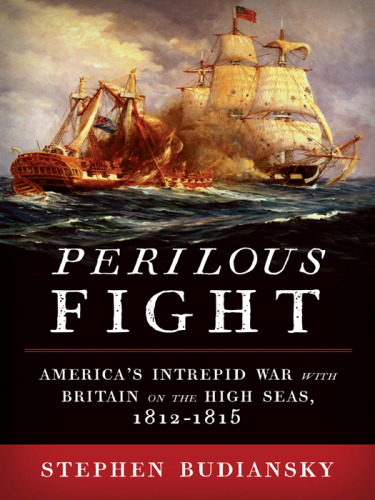
Perilous Fight
America's Intrepid War with Britain on the High Seas, 1812-1815
- اطلاعات
- نقد و بررسی
- دیدگاه کاربران
نقد و بررسی

October 11, 2010
The deservedly overshadowed War of 1812 was redeemed by heroics at sea, according to this rousing military history. Journalist and military historian Budiansky (The Bloody Shirt) follows the tiny United States Navy, led by a handful of superfrigates, including the U.S.S. Constitution, in its oceanic struggle against the vastly larger, stronger, and haughtier British fleet, whose bullying practice of seizing American merchant ships and sailors provoked the war. Budiansky makes it a classic David and Goliath story, as the plucky Yanks, with better ships, sailing, and gunnery, win a string of resounding victories that wipe the smirks from their adversaries' faces. The author's colorful narrative is full of gory sea battles, chivalrous flourishes, mutinous tars, and charismatic performances by Stephen Decatur, David Porter, and other American naval legends; it becomes grayer and grimmer as the British blockade tightens and the Americans turn from pitched battles to prosaic commerce raiding. Budiansky's well-researched and skillfully written account extracts a gripping true-life naval saga from an otherwise inglorious conflict. 8 pages of color and 8 pages of b&w photos; 11 photos in text; 8 maps.

October 15, 2010
This early entry in the likely flood of books on the 200th anniversary of the War of 1812 focuses on the naval action.
Journalist and military historian Budiansky (The Bloody Shirt: Terror After Appomattox, 2008) notes that 1812 has as good a claim as any American war to the title "the forgotten war"—understandably, considering that it was at best a draw for the United States. In Jefferson's administration, the government wasn't sure it needed a navy at all; only the Barbary pirates seemed to justify keeping a few warships. Attitudes changed when Britain, embroiled in its war against Napoleon, began raiding American ships for sailors. A British ban on American merchants trading with France also gave the U.S. a casus belli. Britain's refusal to concede these points resulted in open conflict, during which America was effectively forced to invent a navy from bare bones. Surprisingly, American sailors gave a good account of themselves in the early going. But William Jones, recruited to serve as Secretary of the Navy, recognized that single-ship duels were a losing strategy and issued orders to concentrate on commerce raiding. Consequently, for the majority of the war, American privateers and commerce raiders preyed on British ships, from the Pacific whaling grounds to the Irish Sea. Budiansky gives a solid account of all major naval actions and a fine picture of the personalities of the key figures—especially the proud American captains William Bainbridge, Stephen Decatur and Isaac Hull, and their British counterparts. The author also looks at the fate of American prisoners of war and at the larger political issues behind the war. The Treaty of Ghent brought the war to an end early in 1815, with Britain formally conceding none of the American demands. In practice, the impressments of American sailors ceased, ending the major bone of contention. Budiansky sees the result as an early example of asymmetric war, in which a weaker power prolongs the conflict by choosing to fight only on favorable terms until its opponent grows tired of the exercise.
Highly readable and especially useful as an overview of the early days of the U.S. Navy.
(COPYRIGHT (2010) KIRKUS REVIEWS/NIELSEN BUSINESS MEDIA, INC. ALL RIGHTS RESERVED.)

December 1, 2010
Both sides in the War of 1812 wanted to quickly forget this bloody three-year fight whose last costly battle took place after the peace treaty was signed--and most people have been forgetting it ever since. This second war for independence was filled with political disputes, mistaken appointments to command, and a multitude of blunders on land. Perhaps the only heroics were at sea, where the Americans had the best of the British, though the latter possessed the largest fighting fleet in the world. It was these victories at sea that silenced the debate between Republicans and Federalists over whether there should even be a U.S. Navy. Budiansky (The Bloody Shirt: Terror After the Civil War) presents the story of the war at sea in as objective an account as possible. He offers the unvarnished truth of the ineptitude--on both sides--of many of those involved. From politicians to military and naval commanders emerges the gritty story of the courage of Americans to see the conflict through to the end. VERDICT For those looking for the story behind the story, this book will enlighten and leave some shaking their heads over how this conflict even happened. Strongly recommended. Libraries should have on hand for the upcoming bicentennial.--David Lee Poremba, Keiser Univ. Lib., Orlando, FL
Copyright 2010 Library Journal, LLC Used with permission.




دیدگاه کاربران